Daily Vocabulary Words: List of Daily Used Words in Leading Indian Newspapers
Hi there. Welcome to this special section @ Wordpandit. Our endeavour here is straightforward: highlighting daily vocabulary words that you would come across in leading newspapers in the country. We have included the following newspapers in our selection:
• The Times of India
• The Economic Times
• Hindustan Times
• Mint
• Indian Express
We are putting in extensive work to develop your vocabulary. All you have to do is be regular with this section and check out this post daily. This is your repository of commonly used words; essentially, we are posting a list of daily used words. Hence, this has significant practical application as it teaches you words that are commonly used in leading publications mentioned above.
Visit the website daily to learn words from leading Indian newspapers.
WORD-1: Trite
CONTEXT: Calls for artificial intelligence (AI) regulation have become trite; of course, we need regulation for AI, just like we need regulation for any other technology that has the potential to hurt humanity.
SOURCE: The Times of India
EXPLANATORY PARAGRAPH: Imagine if you hear the same joke many times. After a while, it’s not funny anymore because it’s old and used a lot. That’s what “trite” means – something that is not fresh or original because it has been used too much.
MEANING: Lacking originality or freshness due to overuse (adjective).
PRONUNCIATION: tryt
SYNONYMS: Clichéd, Hackneyed, Overused, Banal, Stale.
USAGE EXAMPLES:
1. The movie’s plot was trite and predictable.
2. She avoided using trite expressions in her writing.
3. His apology sounded trite after so many repetitions.
4. The dialogue in the play was trite and uninspiring.
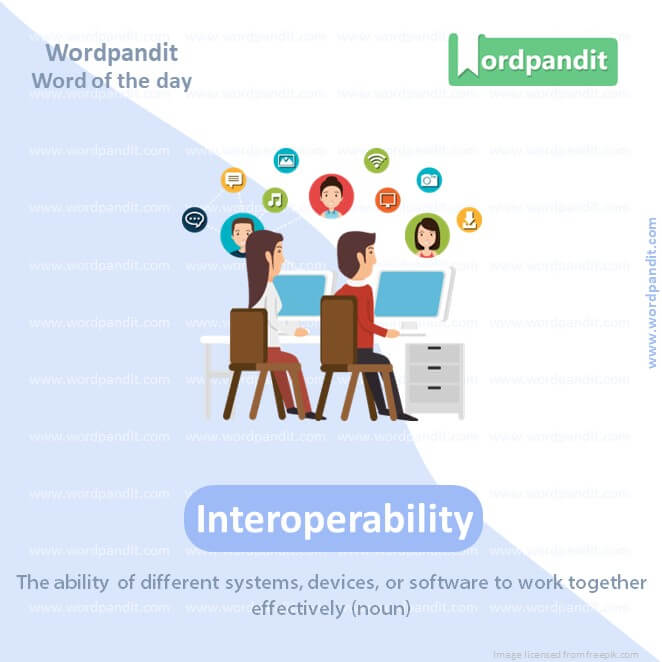
WORD-2: Interoperability
CONTEXT: And that regulation must cater to the interests of stakeholders globally, simply because we live in a globalised world, AI is a global technology, and interoperability across jurisdictions matters. So, what’s the fuss about? Well, this is where things get a little murky.
SOURCE: The Times of India
EXPLANATORY PARAGRAPH: Imagine you have toys from different sets, and they can all play together nicely. Interoperability is like that but for computers and machines. It means they can work together even if they are different.
MEANING: The ability of different systems, devices, or software to work together effectively (noun).
PRONUNCIATION: in-tur-aw-puh-ruh-bil-i-tee
SYNONYMS: Compatibility, Interchangeability, Integration, Coordination, Conjunction.
USAGE EXAMPLES:
1. The interoperability of the software allows it to run on different operating systems.
2. Engineers are working to improve the interoperability of smart home devices.
3. The project’s success depended on the interoperability of various technologies.
4. Lack of interoperability can lead to inefficiencies in communication systems.
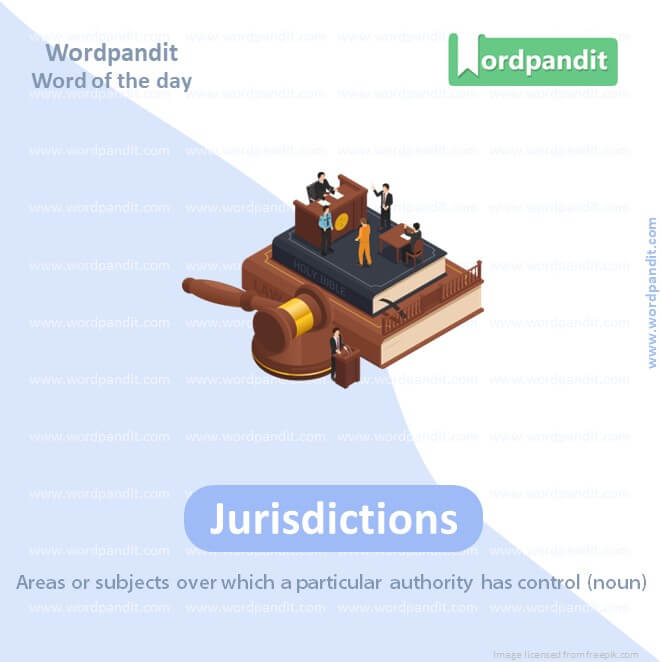
WORD-3: Jurisdictions
CONTEXT: And that regulation must cater to the interests of stakeholders globally, simply because we live in a globalised world, AI is a global technology, and interoperability across jurisdictions matters. So, what’s the fuss about? Well, this is where things get a little murky.
SOURCE: The Times of India
EXPLANATORY PARAGRAPH: Think of a big map with different areas. Each area has its own rules and the people in charge. Jurisdictions are these areas with their own rules and bosses.
MEANING: Areas or subjects over which a particular authority has control (noun).
PRONUNCIATION: joor-iss-dik-shuhns
SYNONYMS: Authority, Domain, Control, Range, Territory.
USAGE EXAMPLES:
1. Different police jurisdictions were involved in the investigation.
2. The court’s jurisdiction extended over several counties.
3. They argued over which jurisdiction the case should be tried in.
4. The federal and state jurisdictions sometimes overlap.
WORD-4: Murky
CONTEXT: And that regulation must cater to the interests of stakeholders globally, simply because we live in a globalised world, AI is a global technology, and interoperability across jurisdictions matters. So, what’s the fuss about? Well, this is where things get a little murky.
SOURCE: The Times of India
EXPLANATORY PARAGRAPH: Think about trying to see through a glass of dirty water. It’s hard to see through because it’s not clear. That’s what murky means – something that is dark or unclear.
MEANING: Dark and gloomy, or not clear, making it hard to see through (adjective).
PRONUNCIATION: mur-kee
SYNONYMS: Cloudy, Obscure, Muddy, Dark, Opaque.
USAGE EXAMPLES:
1. The water in the pond was murky and stagnant.
2. He found himself in a murky situation with no clear solution.
3. The details of the plan remained murky and confusing.
4. She peered into the murky depths of the forest.
WORD-5: Mitigation
CONTEXT: For starters, regulators and interest groups do not yet align on a common definition of “AI” to regulate it. However, this hasn’t kept them from getting into heated debates over the nature, scope, and urgency of AI-related risks and what technical and policy interventions are most critical for their mitigation.
SOURCE: The Times of India
EXPLANATORY PARAGRAPH: Imagine you fall and hurt your knee. You put ice on it to make it hurt less. Mitigation is like the ice; it’s a way to make something bad less severe or harmful.
MEANING: The action of reducing the severity or seriousness of something (noun).
PRONUNCIATION: mi-ti-gay-shun
SYNONYMS: Alleviation, Reduction, Lessening, Relief, Moderation.
USAGE EXAMPLES:
1. The company took steps for the mitigation of environmental damage.
2. Mitigation measures were put in place to reduce the impact of the flood.
3. He argued for mitigation of the sentence based on good behavior.
4. The new policy provided mitigation against financial losses.
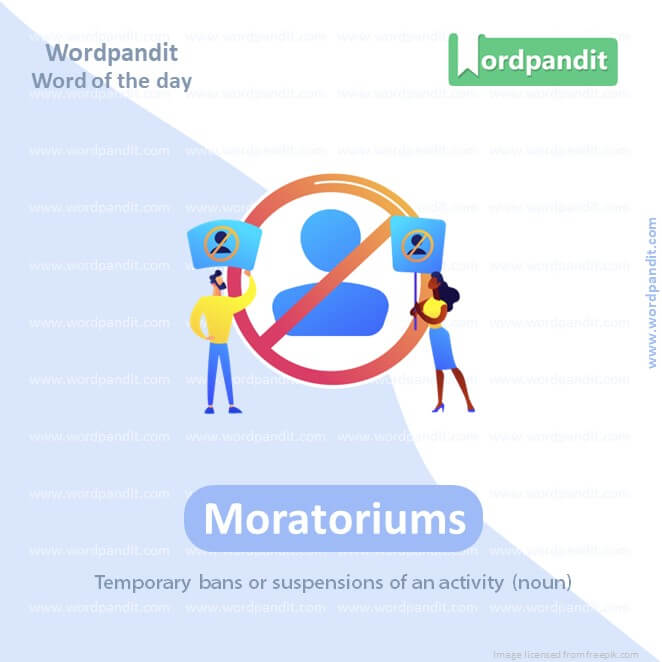
WORD-6: Moratoriums
CONTEXT: While some safety advocates claim that AI poses existential risks for humanity as they call for moratoriums and bans on AI innovation, others think such claims and proposals are misguided and could divert the scare regulatory resources from addressing the risks that AI poses in the here and now, like bias and misinformation.
SOURCE: The Times of India
EXPLANATORY PARAGRAPH: Think of a “pause” button on a video game. When you press it, the game stops for a while. A moratorium is like that pause button but for activities or actions – it’s a temporary stop.
MEANING: Temporary bans or suspensions of an activity (noun).
PRONUNCIATION: mo-ruh-tor-ee-uhms
SYNONYMS: Bans, Suspensions, Freezes, Halts, Pauses.
USAGE EXAMPLES:
1. The government imposed moratoriums on logging in the area.
2. There was a moratorium on new constructions in the historic district.
3. The committee recommended a moratorium on testing the new drug.
4. Environmentalists called for a moratorium on offshore drilling.
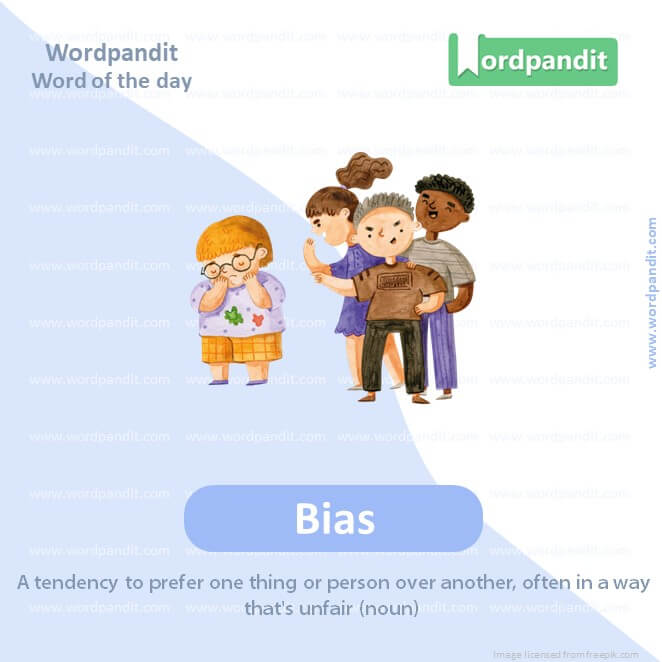
WORD-7: Bias
CONTEXT: While some safety advocates claim that AI poses existential risks for humanity as they call for moratoriums and bans on AI innovation, others think such claims and proposals are misguided and could divert the scare regulatory resources from addressing the risks that AI poses in the here and now, like bias and misinformation.
SOURCE: The Times of India
EXPLANATORY PARAGRAPH: Imagine you have two ice cream flavors, but you always pick chocolate because you like it more. Bias is when you like one thing or person better than another, not always for a good reason.
MEANING: A tendency to prefer one thing or person over another, often in a way that’s unfair (noun).
PRONUNCIATION: by-uss
SYNONYMS: Prejudice, Partiality, Favoritism, Inclination, Tendency.
USAGE EXAMPLES:
1. The teacher’s bias towards certain students was obvious.
2. To avoid bias, the judge recused himself from the case.
3. The survey results were skewed by the interviewer’s bias.
4. It’s important to recognize and challenge our own biases.
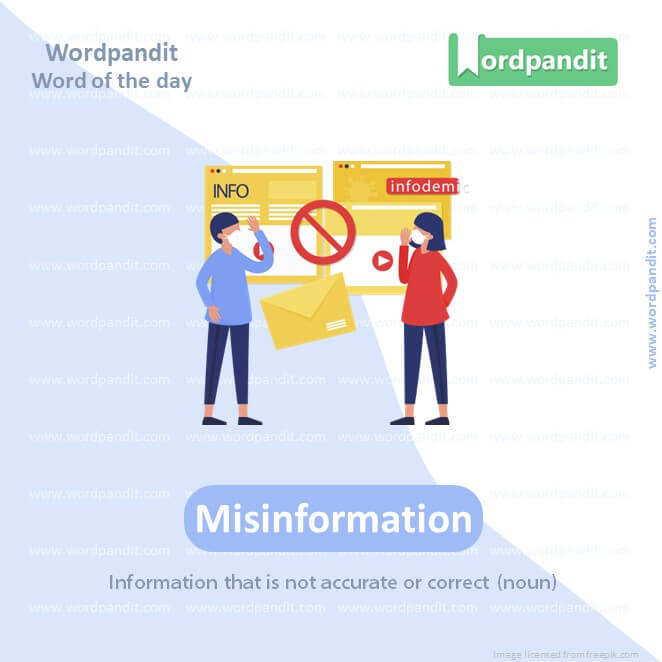
WORD-8: Misinformation
CONTEXT: While some safety advocates claim that AI poses existential risks for humanity as they call for moratoriums and bans on AI innovation, others think such claims and proposals are misguided and could divert the scare regulatory resources from addressing the risks that AI poses in the here and now, like bias and misinformation.
SOURCE: The Times of India
EXPLANATORY PARAGRAPH: Imagine someone tells you that elephants can fly. That’s not true, right? Misinformation is like that – it’s information that is not true, but people might believe it.
MEANING: Information that is not accurate or correct (noun).
PRONUNCIATION: mis-in-for-may-shun
SYNONYMS: Falsehood, Inaccuracy, Untruth, Deception, Fabrication.
USAGE EXAMPLES:
1. The article was retracted due to the spread of misinformation.
2. Social media platforms are battling the spread of misinformation.
3. Misinformation about the disease caused unnecessary panic.
4. It’s important to check facts to avoid misinformation.
WORD-9: Proprietary
CONTEXT: Second, stakeholders continue to hold conflicting positions on several key policy questions around AI trust and safety. How should web scraping of personal and proprietary data for AI development be regulated?
SOURCE: The Times of India
EXPLANATORY PARAGRAPH: Think of a toy that you made yourself. You wouldn’t want others to claim it’s theirs because it’s your special creation. Proprietary means something is owned by someone, especially something unique or special.
MEANING: Relating to owning something, especially intellectual property (adjective).
PRONUNCIATION: pruh-pry-i-tair-ee
SYNONYMS: Exclusive, Owned, Private, Patented, Personal.
USAGE EXAMPLES:
1. The software’s proprietary algorithm was its unique feature.
2. They used proprietary technology in their new product.
3. The proprietary rights of the invention were legally protected.
4. The recipe is a proprietary secret of the company.
WORD-10: Catastrophic
CONTEXT: Who should own AI-generated artworks and inventions? How should liability be attributed for harm caused by an AI system? Is openness in AI development desirable? With the fears of catastrophic AI looming large, is government licensing a cure-all?
SOURCE: The Times of India
EXPLANATORY PARAGRAPH: Imagine a really, really big storm that causes a lot of damage. Something catastrophic is like that storm – it’s very bad and causes a lot of harm or damage.
MEANING: Causing great damage, suffering, or change (adjective).
PRONUNCIATION: kat-uh-straf-ik
SYNONYMS: Disastrous, Devastating, Destructive, Calamitous, Ruinous.
USAGE EXAMPLES:
1. The earthquake was a catastrophic event.
2. The company faced catastrophic losses after the scandal.
3. Catastrophic flooding affected thousands of people.
4. The decision had catastrophic consequences for the environment.
Vocabulary
Language is a confluence of thoughts, emotions, and experiences that find vibrant expression through words. In this spectrum, ‘vocabulary’ shines as a critical aspect that shapes and directs our language proficiency. It offers depth, nuance, and clarity to our expressions. However, mastering ‘vocabulary’ is an art that requires a strategized approach.
An intensive strategy for learning ‘vocabulary’ goes beyond the limiting precincts of memorization. Instead, it nudges learners towards comprehension and application. To understand ‘vocabulary’, take a step forward from traditional textbooks and classroom sessions, and embrace the vast world of books, articles, podcasts or digital content in the language you are learning. This step allows you to understand words in context, see how they are used in different situations, and absorb words as part of the natural flow of language.
As you journey through ‘vocabulary’, remember that this expedition should not be a race. Rather, it’s a marathon where pacing yourself is pivotal to long-term success. Learning a few words each day and consolidating your knowledge through regular revision tends to be more effective, as it prevents cognitive overload and promotes solid retention.
Interactive learning tools can provide valuable support in assimilating ‘vocabulary’. Use of flashcards, language-learning apps, or memory-enhancing software can make this process more engaging and effective, reinforcing the ‘vocabulary’ in your memory.
Lastly, practice is an incontrovertible part of mastering ‘vocabulary’. Utilize the learnt vocabulary in your daily conversations, write-ups, or presentations to ensure an active application. Doing this fosters recall and cements understanding.
In summation, learning ‘vocabulary’ is a journey that should be embraced with an integrated approach, where understanding and application are the key elements. By engaging with diverse learning resources, pacing the learning process, employing interactive learning tools, and practicing regularly, the journey of mastering ‘vocabulary’ becomes a fulfilling and enriching experience.













